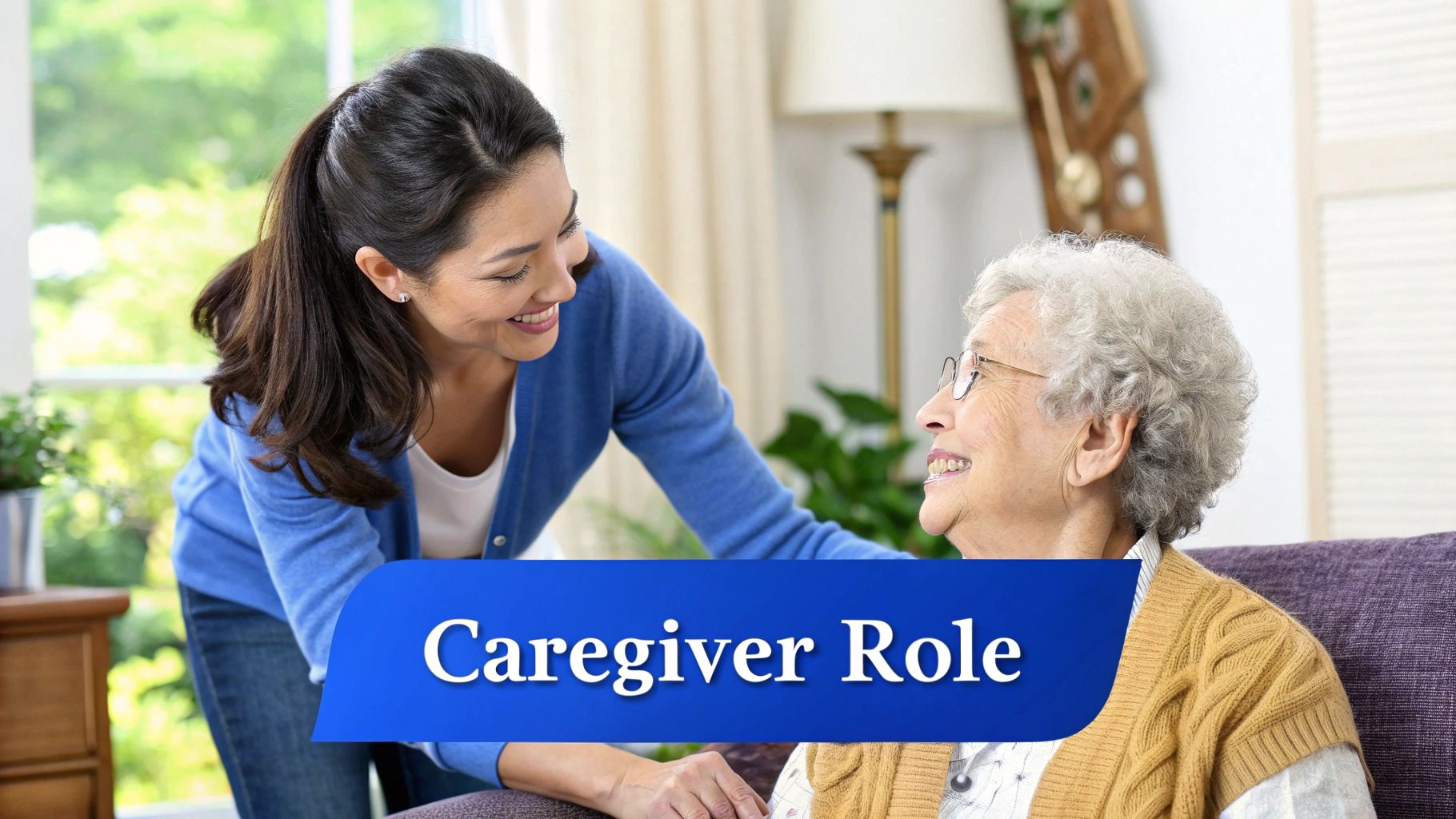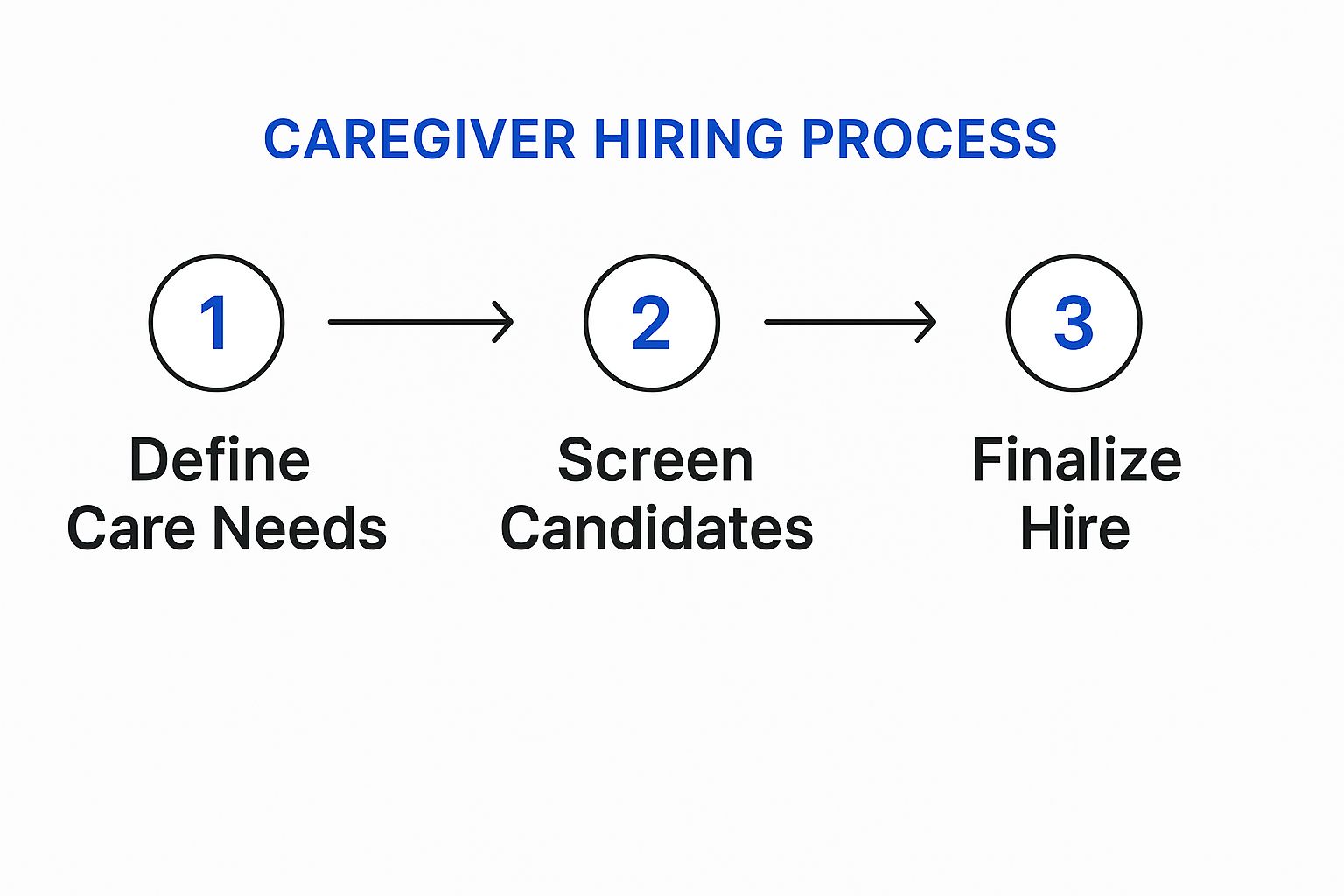Bringing a caregiver into your home is one of the biggest, most personal decisions you'll ever make for your family. This isn't just about hiring help; it's about finding a trusted, compassionate support system that allows your loved one to live with dignity and independence where they feel most comfortable. Think of this guide as a supportive partner, here to walk you through every single step.
Why Finding the Right Caregiver Matters More Than Ever

The world of senior care is changing right before our eyes. More and more, older adults are choosing to "age in place." It's a powerful preference to stay in the familiar comfort of their own homes, surrounded by memories and community, rather than moving into a facility.
But this shift brings a new set of challenges for families. Suddenly, you're tasked with finding a reliable, skilled, and genuinely empathetic person to provide that essential support. The whole process can feel heavy, packed with both emotional weight and practical hurdles.
The Growing Demand for In-Home Care
This desire to age at home isn't just a passing trend—it's a massive demographic shift. The result? An unprecedented demand for qualified in-home care professionals. The search for the right person is more competitive, and more critical, than ever before.
The numbers don't lie. Employment for home health and personal care aides is expected to jump by 21% between 2023 and 2033, a growth rate that far outpaces most other jobs. This surge is fueled by an aging population, with the number of Americans over 65 projected to climb from 57.8 million in 2022 to nearly 89 million by 2060. You can explore more of these home care industry trends to see the bigger picture.
This isn't just about filling a role; it's about enriching a life. The goal is to find a professional who not only meets the physical needs of your loved one but also fosters a genuine connection built on trust and respect.
A Partnership Built on Trust
We've designed this guide to approach hiring a caregiver as a human-centered journey, not a clinical checklist. We get it. You’re not just looking for a helper; you’re searching for a true partner in care.
We'll break it all down with actionable steps and real-world advice to help you:
- Clearly define what your family actually needs.
- Source and properly vet qualified candidates.
- Conduct interviews that reveal true character and compassion.
- Navigate your legal and financial responsibilities.
By focusing on finding that perfect fit, you can ensure your loved one gets the quality care they deserve—and bring much-needed peace of mind to your entire family.
Defining Your Real-World Care Needs
Before you even think about looking at resumes or calling an agency, your first move should be to get a crystal-clear, honest picture of the support your loved one actually needs. This isn't about making a generic to-do list; it's about building a practical, day-in-the-life care plan. Trust me, vague requests only lead to mismatched candidates and a whole lot of frustration down the line.
Think of a detailed plan as your roadmap. It helps you spell out exactly what you're looking for when hiring a caregiver, making sure you attract people with the right skills and, just as importantly, the right temperament. Getting this clarity upfront is what sets the stage for a successful and respectful relationship from day one.
Look Beyond the Obvious
So many families get laser-focused on just the medical or physical tasks, but great care goes so much deeper than that. Truly comprehensive caregiving is about supporting the whole person—their physical, emotional, and social well-being. The best way to start is by walking through a typical day and week for your loved one.
Try breaking their needs down into a few key categories. A little structure here goes a long way in making sure you don't forget the small but significant details that make a huge difference in their quality of life.
Here are the core areas I always tell families to evaluate:
- Personal Care: This is all the hands-on assistance with what experts call "activities of daily living" (ADLs). We're talking about things like help with bathing, dressing, grooming, and using the restroom.
- Medical Support: Does Mom need consistent medication reminders? Does Dad need a steady hand with his walker or someone to check his blood pressure? Be really specific about the level of medical oversight required.
- Household Management: This bucket covers all the tasks that keep the home environment comfortable and running smoothly. Think light housekeeping, laundry, preparing healthy meals, or running to the grocery store.
- Companionship and Engagement: This is a huge one, and it's so often underestimated. Does your loved one need someone to talk to, play a game of cards with, or take them on a walk? Isolation can be just as damaging as a physical ailment.
Create a Detailed Care Checklist
Once you’ve brainstormed in these categories, it's time to get it all down on paper. A simple checklist is the best way to turn those needs into a tangible job description. This document will become your best friend during interviews.
To get you started, here’s a simple table to help organize your thoughts and build a comprehensive list of duties.
A detailed checklist is your most powerful tool for finding the right caregiver. It helps you define the role clearly, communicate your expectations during interviews, and set a solid foundation for the working relationship.
Care Needs Assessment Checklist
| Care Category | Specific Tasks (Examples) | Required Frequency (Daily, Weekly, As-Needed) |
|---|---|---|
| Personal Care | Assistance with morning dressing and grooming | Daily |
| Medical Support | Reminders for morning and evening medications | 2x Daily |
| Household | Prepare and cook nutritious lunch and dinner | Daily |
| Companionship | Accompany to weekly doctor's appointments | Weekly |
| Mobility | Support with standing up from a chair | As-Needed |
Use this as a starting point and customize it to fit your family’s unique situation. The more detail you can add, the better.
Pro Tip: Involve your loved one in this process as much as you can. Simply asking them what they feel they need help with fosters a sense of agency and respect. It ensures the care plan is collaborative, not just something that's being done to them.
By investing a little time to define these needs upfront, you’re doing so much more than just writing a job description. You’re creating a clear set of expectations that protects both your family and the caregiver. I can tell you from experience, this simple act of preparation is the single most effective way to prevent misunderstandings and build a trusting, long-term care relationship.
How to Find and Vet Potential Caregivers
Now that you have a solid care plan, it’s time to start looking for the right person to bring it to life. For many families, this part feels like the most daunting. But if you break it down into two manageable phases—sourcing and vetting—the whole process becomes much clearer.
Right off the bat, you have two main routes you can go: work with a home care agency or hire an independent caregiver directly. Each path has its own set of pros and cons, and the right choice really depends on your family's needs and how hands-on you want to be.
An agency, like NJ Caregiving, does a lot of the heavy lifting. They handle recruiting, screening, payroll, taxes, and even provide liability insurance. If your main caregiver calls out sick, the agency finds a qualified replacement so you’re never left in a lurch. This convenience does come at a premium—agencies are often 20-30% more expensive—but it buys you peace of mind and frees you from a ton of administrative work.
Hiring privately puts you in complete control. You get to hand-pick the person you bring into your home and can often create a more flexible, personalized arrangement. This is a fantastic option if you already know someone trustworthy, maybe through a friend or a local community group. Just remember, this route makes you an employer. You'll be on the hook for everything from background checks to payroll taxes.
Sourcing Your Candidates
Where you look for potential caregivers will depend on whether you’re using an agency or going it alone. Either way, you’ll need to be proactive.
Here are a few of the most common ways to find people:
- Home Care Agencies: This is the most direct path. A quick online search for local agencies will pull up a list of options. Make sure you read reviews and ask them to walk you through their specific screening process.
- Personal Referrals: Never underestimate the power of word-of-mouth. Talk to friends, neighbors, your doctor, or even people from your church or community center. A glowing recommendation from someone you trust is a huge head start.
- Online Platforms: There are a number of websites designed to connect families with caregivers. These sites can be a good resource and often offer tools for background checks, but at the end of the day, the responsibility for vetting still falls on you.
When you're talking to an agency, go beyond their list of services. Ask them how they match caregivers to clients. A great agency won't just send you the next person on their roster; they'll take the time to find someone whose skills and personality are a good fit for your loved one.
The Critical Vetting Process
Once you have a few potential candidates lined up, the real work begins. Vetting is the one step you absolutely cannot skip—it's all about protecting your loved one.
This is a good overview of how the process should flow, from figuring out your needs to finally making that hire.

As you can see, a structured screening process is what bridges the gap between identifying your needs and finding the right person.
No matter who you're considering, your vetting process needs to cover these three bases:
- Background Checks: You need a comprehensive, national criminal background check. Period. If driving is part of the job, you should also run a check on their driving record. There are plenty of reputable online services that can handle this for a small fee.
- Certification Verification: If the job requires certain credentials, you need to verify them. Ask to see a copy of their Certified Nursing Assistant (CNA) or Home Health Aide (HHA) license, then double-check its status with your state’s licensing board.
- Reference Checks: This is so much more than just confirming dates of employment. When you speak to past employers, dig deeper. Ask specific, scenario-based questions. "Can you tell me about a time they had to handle a stressful situation?" or "How did they show compassion to your family member?" The answers to these questions will tell you far more than a simple "yes, they were a good employee."
Conducting an Interview That Reveals Character

This is it. The interview is your chance to look past the resume and see the real person you might welcome into your home and your loved one’s life. A strong list of qualifications is a great start, but the true magic in caregiving comes from character—patience, empathy, and the ability to stay calm when things get tough.
Your goal isn't just to ask questions; it's to start a conversation that uncovers these essential soft skills.
This step is more critical than ever, as families are stretched thin. The U.S. is grappling with a "caregiving cliff," a point where the demands on family caregivers are becoming unsustainable. In fact, one in five U.S. adults is now a caregiver, a big jump from one in seven back in 2015. Many are part of the "sandwich generation," trying to balance careers and their own kids while also caring for aging parents. It’s an immense amount of pressure. You can get more insights on the challenges working caregivers face on fortune.com.
Ask Questions That Tell a Story
Forget the standard interview questions like, "What are your strengths?" They won't tell you how a candidate will react when your mom is having a difficult day. Instead, shift your focus to scenario-based questions that force them to think on their feet and show you their genuine problem-solving style.
These kinds of questions open a window into their personality and professional instincts. Try a few like these:
- "My mother sometimes gets confused and resists taking her medication. How would you approach that situation?"
- "What would you do if my father took a fall but insisted he was fine and didn't need any help?"
- "Could you tell me about a time you connected with a client who was withdrawn or initially hesitant to accept care?"
Listen closely to their answers. You're looking for responses that prioritize your loved one's dignity, safety, and emotional well-being. A great candidate will talk about gentle redirection, reassurance, and patience—not just about getting a task done.
Key Takeaway: Pay close attention to how they answer. Do they seem thoughtful or flustered? Their demeanor during a tough question can be just as telling as their words.
The Importance of Personal Chemistry
At the end of the day, a successful caregiving relationship often boils down to good old-fashioned chemistry. If it’s possible and feels right, try to involve the person who will be receiving care in the final interview stages. This doesn't need to be a formal grilling; a casual, low-pressure chat is often best.
Their comfort level is the single most important factor. Just watching them interact with the candidate can tell you everything you need to know. Do they seem at ease with this person? Does the candidate speak directly to them with respect, or do they only address you?
This simple observation can give you the confidence you need to make the right choice. Remember, you're not just filling a role. You are finding a partner who will provide support, companionship, and compassionate care to someone you love. Taking the time to get this step right builds a foundation of trust that will make all the difference for years to come.
Getting the Legal and Financial Side Right
Once you’ve found the right person and are ready to hire them directly, you’re stepping into a role you probably never anticipated: employer. It’s a significant shift, and it comes with legal and financial responsibilities that are critical to get right from day one.
Handling these duties properly isn’t just about following the rules—it’s about protecting your family and fairly compensating the dedicated professional you’re bringing into your home. This transition from informal helper to formal employee recognizes the immense value of care work. It’s a field where, in the U.S. alone, about 63 million people provide unpaid care valued at a mind-boggling $873.5 billion each year. You can read more about the economic value of caregiving on otsuka-us.com. Setting up a formal arrangement is a powerful way to acknowledge this contribution professionally.
Understanding Your Tax Obligations
Let’s talk about payroll and taxes, because this is one of the biggest hurdles for families. If you pay a caregiver more than the annual IRS threshold, you are officially a household employer. That means you’re on the hook for withholding and paying Social Security and Medicare taxes (often called FICA taxes).
On top of that, you'll also need to handle federal and state unemployment taxes. It can sound like a lot to manage, but thankfully, there are services that specialize in household payroll that can make this whole process much smoother. Don't be tempted to ignore these obligations; the penalties can be steep.
Important Distinction: A common mistake families make is trying to classify their caregiver as an independent contractor to dodge the tax paperwork. But be warned: if you control the caregiver's schedule, their duties, and how they do their work, the IRS will almost always see them as a household employee. Getting this wrong can lead to a messy situation with back taxes and fines.
The Non-Negotiable Work Agreement
Before your caregiver works their first day, you need a written work agreement. Think of it as your single most important tool for preventing future misunderstandings. This isn't about a lack of trust—it’s about establishing clarity and professionalism for everyone involved.
This document should be your roadmap for the entire working relationship, clearly outlining every expectation and term of employment.
A solid agreement absolutely must include:
- A Clear List of Duties: Be specific. Detail every task, from personal care assistance to light housekeeping or meal prep.
- Work Schedule: Nail down the exact days and hours of work. No ambiguity.
- Compensation: State the hourly pay rate, your overtime policy (especially crucial for live-in or long-hour roles), and the pay schedule (e.g., weekly, bi-weekly).
- Time-Off Policies: Define your rules for handling sick days, vacation time, and any paid holidays.
- Confidentiality Clause: A simple section on respecting your family’s privacy is always a good idea.
Finally, give your insurance agent a call. Your standard homeowner's policy might not cover injuries to someone you employ in your home. Ask about adding workers' compensation or a liability rider. It's a simple step that provides a critical safety net for both you and your caregiver, ensuring everyone is protected if something unexpected happens.
Common Questions About Hiring a Caregiver

As you start the journey of hiring a caregiver, a lot of questions will inevitably come up. It's a process with a lot of moving parts, and getting clear, direct answers is the best way to feel confident you're making the right choice for your family.
Let's walk through some of the most common concerns we hear from families in your exact position.
Agency Versus Direct Hire: What Is the Real Difference?
One of the very first decisions you’ll face is whether to go through a home care agency or hire a private caregiver directly. The choice really boils down to convenience versus control.
When you partner with an agency, the caregiver is their employee, not yours. That means the agency handles all the heavy lifting for you:
- Thorough vetting and extensive background checks.
- Managing all payroll, taxes, and insurance.
- Arranging for backup care if your primary caregiver is sick or on vacation.
This route offers incredible peace of mind but often costs 20-30% more. On the flip side, hiring someone directly makes you the employer. You get total control over who you bring into your home and can often save some money, but you're on the hook for every administrative task, from filing taxes to scrambling for last-minute coverage.
How Much Should I Expect to Pay a Caregiver?
There’s no single answer to this question. Caregiver pay rates can vary dramatically depending on where you live, the caregiver’s experience and certifications, and how complex the required care is.
On average, you can expect hourly rates to fall somewhere between $15 and over $35 per hour. It's crucial to research the going rates in your specific city or county to offer a fair and competitive wage. Don't forget, if you hire directly, you also have to budget for employer taxes on top of that hourly rate, which can add a significant chunk to your total costs.
A strong work agreement is your best tool for clarity and protection. It should detail duties, schedule, pay rate (including overtime), and policies for sick days, vacation, and emergencies. This document prevents misunderstandings by setting clear, professional expectations from the start.
What Should a Caregiver Work Agreement Include?
A written work agreement is absolutely non-negotiable. It doesn’t matter if you’ve known the person for years or just met them—this contract protects both of you by putting the terms of employment in black and white.
Make sure your agreement clearly outlines:
- A detailed list of duties and responsibilities. Be specific!
- The exact work schedule, including start and end times.
- Compensation details, like the hourly rate, overtime policy, and how often they'll be paid.
- Policies for time off, covering sick days, vacation, and holidays.
- Clauses on confidentiality and the terms for termination.
At NJ Caregiving, we handle all these details so you can focus on what matters most—your loved one's well-being. If you're looking for a trusted partner to provide compassionate, professional in-home care in the Princeton area, explore our services at https://njcaregiving.com.


